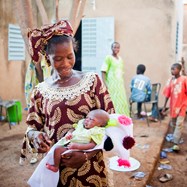Blog: Building bridges with Africa
07 November 2018
Dr Hollie Chandler writes about the importance of building research partnerships between Russell Group universities and their African counterparts.
HEPI’s decision to theme its upcoming annual lecture on African higher education is welcome. From a UK perspective, there has been far less discussion on research and education in Africa than other continents, including across the Atlantic and in Asia. Yet there is huge potential for African and UK universities to collaborate more closely and such partnerships are becoming increasingly important.
Last week Russell Group Vice-Chancellors hosted their opposite numbers from the African Research Universities Alliance (ARUA). It was the first meeting of its kind and paves the way for future engagement. The appetite to work more closely was clear on both sides, as were the global ambitions of the African delegation.
ARUA has a clear goal: to make a difference to the delivery of higher education in Africa and to build Africa’s contribution to knowledge around the world. Within the next decade, the network wants to increase its input to international, cutting-edge research from 1% to 5%. In the same period, it wants to move from having one African university in the world’s top 200 to at least 10. The African Vice-Chancellors spoke of harnessing new technologies, growing their research capacity and consolidating existing pockets of excellence. Among their research priorities are global warming, urbanisation and habitable cities, as well as non-communicable diseases.
The energy with which ARUA is pushing for progress appears to be opening opportunities –during their visit to London, the African Vice-Chancellors met with UKRI Head, Mark Walport, as well as the Government’s Chief Scientific Adviser, Patrick Vallance. These meetings followed the signing of a Memorandum of Understanding between UKRI and ARUA to strengthen research collaborations and enhance capacity across African and UK research communities. The new partnership is part of UKRI’s ongoing efforts through the Global Challenges Research Fund (GCRF) and more detail should emerge shortly on what this agreement will look like in practice.
For UK universities, some exciting and important collaborations are already taking place. Manchester University is helping develop the Square Kilometre Array in South Africa which, when complete, will be the world’s biggest and most powerful radio telescope. Durham University is working with the Ministry of Electricity in Sudan to develop wind turbines which can operate effectively in tropical zones. Sheffield University is working with the African Rice Centre to develop rice crops resilient to the striga parasite, which can wipe out entire yields. And there is immense potential to do more.
To give some scale: between 2015 and 2017 the UK published 162,000 papers in collaboration with academics across the EU, and about half that number with the US. Over the same period, the UK published just over 7,000 papers in collaboration with South Africa and less than 2,000 with Kenya. The UK’s GCRF can be an effective tool for increasing partnerships. But while the strategy may come from institutions, it is the academics and doctoral students from the UK and Africa who need to build their connections and develop the winning research proposals.
Mobility will be key. This was a recurring theme at last week’s meeting between the Russell Group and ARUA: fostering a flow of people and ideas which benefits both sides. While many African doctoral students have studied in the UK, lots do not return home to contribute to Africa’s research. A priority for our respective governments and institutions should therefore be to encourage researcher mobility between our countries and to support doctoral training opportunities within the UK without resulting in a loss of talent from Africa.
Joint or split-site doctorates, potentially supported by GCRF funding, may be one solution. But shorter trips of 3-6 months for doctoral students and early-career researchers can also be incredibly valuable to training and help researchers to establish important connections. These trips can be supported through funding, but it’s also important to ensure that immigration policies facilitate such exchange.
As more policy makers and academics see the benefits in greater African-UK higher education engagement, we can expect such issues to rise up the agenda. All the better for world research and burgeoning UK-Africa relations.
First published on the HEPI website.
-
Hollie Chandler
Hollie.Chandler@russellgroup.ac.uk
020 3816 1307
 X
X


